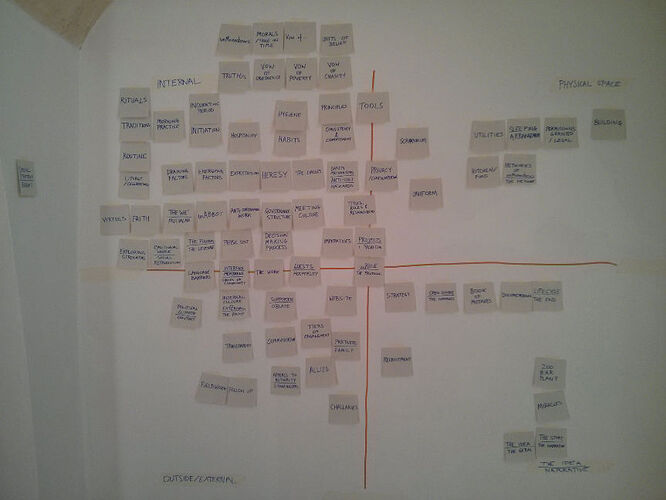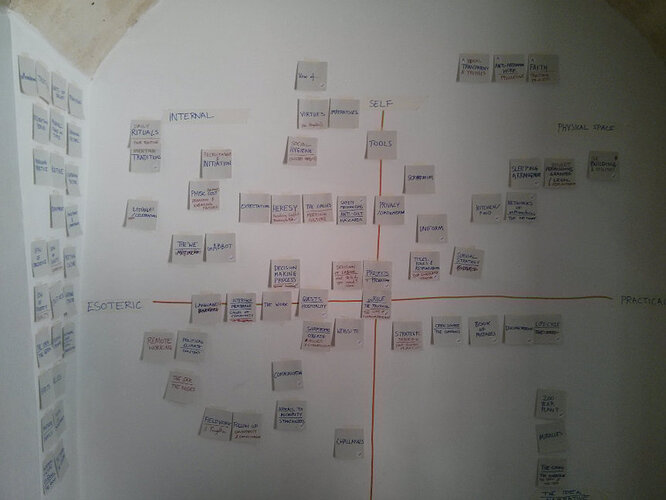Okay, so hotly discussed subject, often appearing in the abstract or as a place for divergent thinking - the time has come now to concretely pin down what we mean by ‘unMonastery in-a-box’ and begin to produce it.
I’ve tried to gather together an overview for everything that’s been produced and thought about to date, if you have other documents please add to the list below.
Why do we need this?
unMonastery since it’s birth has been predicated on the idea of easy replication, in order to give rise to a network of spaces - at least conceptually this thinking is heavily indebted to the hackerspace model. Hackerspaces replicate through Design Patterns this is a good way to go but a little sterile for the unMonastery vision.
In order to even begin to call our prototype a success for the future development and spread of unMonastery we need to unload, decant and further distill the knowledge we have generated in Matera about how the model functions. What we produce needs to be highly accessible, replicable and forkable.
What is it?
So, after much deliberation, I think it’s important we start by creating strong foundations that can thrive off simplicity - rather than the deeply complex intentions previously envisioned for a sort of Github for hardware/social space. I do think though that it would be good for it to literally fit in a box.
The Key Components:
- Stack of Cards [See Methodkit]
- Wiki [Capable of being printed with PediaPress]
- The Book of Mistakes
- The Protocol 1.0 (NOTE: proper validation of rules into Protocol is a long, brain- and computation-intensive process. At the time of the second unMon instantiation we can hope at best for a set of candidate rules)
- Tech Stack [Software Installed on Raspberry Pi and OS image on USB]
- Talking Piece
The basic concept for creating meaningful relationships between each component will be predicated on the depth of reference needed by the user / unMonasterian. Methodkit has demonstrated itself to be an effective store of knowledge that can be used effectively in face to face collaboration to build a project (also see How To Use MethodKit)
Since existing MethodKits have to date focused on gathering knowledge into one place for existing disciplines or projects, there hasn’t been a need for a place to store all the knowledge, since generally it’s easily accessible from a google search. For unMonastery this is where the wiki comes in - each card will directly reference a wiki page.
Each wiki page will contain at least a description of how we do things in Matera, with well linked references to EdgeRyder discussions and trello cards (everything useful in google docs should also be migrated to the wiki). Ideally each page should also contain: Design Pattern, alternatives approaches, Metadata (i.e how long was this tested for, who was involved etc), templates, related software, the relevant protocol/rule, relevant mistakes, videos and other pieces of information specific to each area.
These two elements will be the initial building blocks for the box. On top of this comes The Book of Mistakes and The Protocol.
In terms of the tech stack, @marc has put together an initial scope of what might be included. Principally though we’d like to assess and include a set of technologies that match the way we have been accounting, managing resources and communicating. With a view to lowering the operational costs for initial setup and reducing debate around one piece of software over another. Everything though will be open-source.
Going Forward
- Hold a meeting at 18:00 on Monday 23rd at unMon to discuss.
- Establish a weekly community call for remote participation - and establish an amplified team
- Following the amplified team approach use the top of this wiki to give updates on progress going forward and calls to action.
- 24th Deploy Wiki
- Aim to have a complete list of initial card titles by 5th of July, with definition of wiki format and accompanying content migrated.
- 14th Produce whole card deck in single sprint.
- By end of July produce single serving page to explain and easily share unMo in-a-box
Links
Replicating unMonastery: Pattern languages and unMonastery in-a-box [LOTE3 Session]
Replicating unMonastery : session documentation [LOTE3 Documentation]
Initial Patterns for unMonastery
unMonastery in-a-box Methodkit working doc [Missing, will find]
unMon in-a-box / IT Infrastructure
unMonastery and EdgeRyders - Amplified Teams
ALL THE KNOWLEDGE REPOSITORIES: Google Folder / Trello / Pbworks

